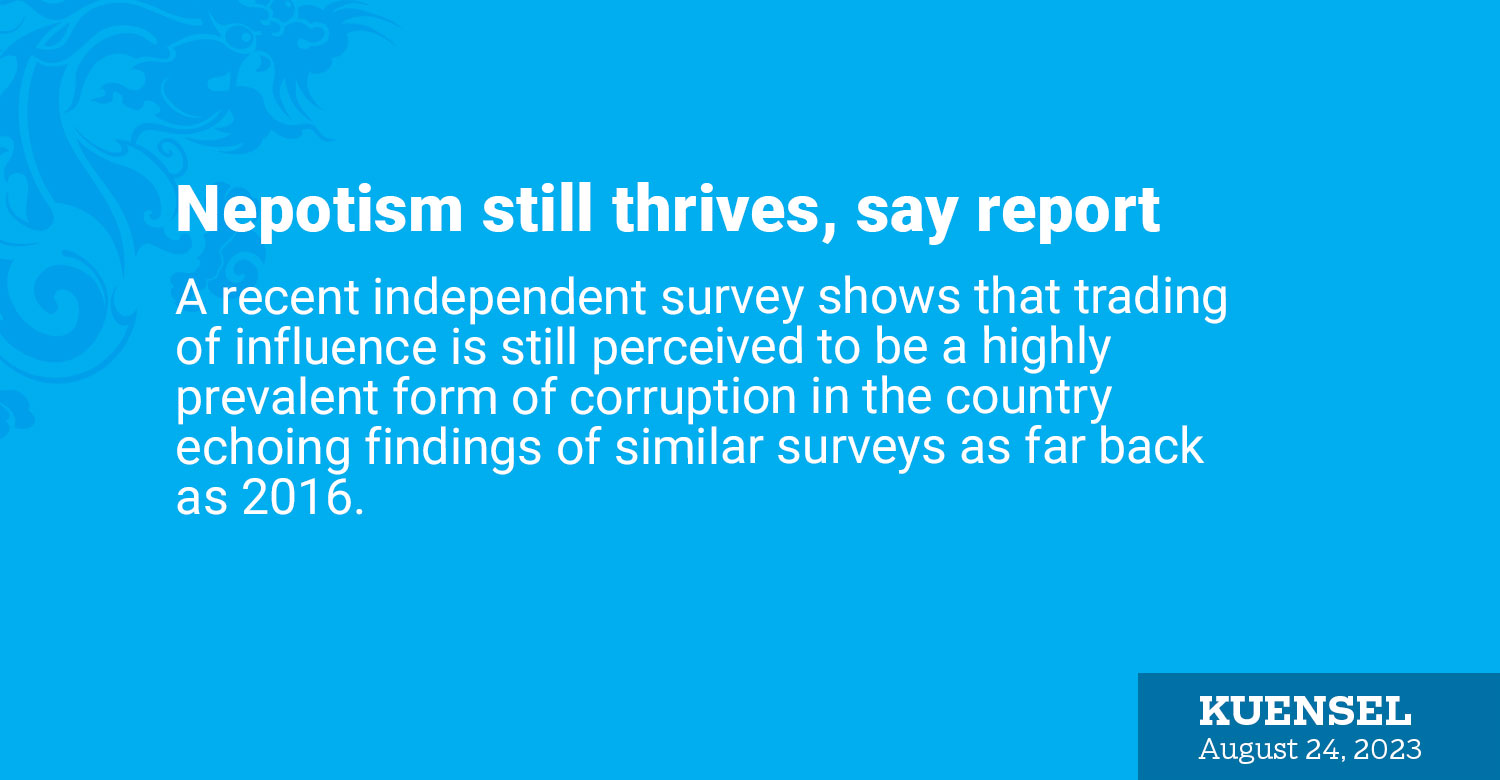Jigmi Wangdi
A recent independent survey shows that trading of influence is still perceived to be a highly prevalent form of corruption in the country echoing findings of similar surveys as far back as 2016.
According to the National Corruption Barometer Survey (NCBS) 2023, the perception of trading of influence prevails as the highest form of corruption. The NCBS 2016 and 2020 also reported the same findings. Trading of influence consists of corruption such as nepotism and favouritism.
The 2023 report shows that trading of influence exists highest in the private sector (15.7 percent), ministries (12.9 percent), financial institutions (12.7 percent), and gewogs (11.2 percent).
The Anti-Corruption Commission’s National Integrity Assessment 2022 report showed that employees perceived the most influential factors in providing services faster were friendship (22.47 percent), family relationships (17.33 percent), and instructions from superiors (16.04 percent).
A change observed in the concentration of corruption is the perception that corruption is now rampant at the lower levels, compared to the past when people believed corruption was concentrated at the executive level.
According to the NCBS 2023, respondents said that the lower-level staff follow orders from the superiors, and their working condition is oriented by them. Therefore, lower-level people are perceived to be involved in corruption more than those at the executive level.
The study also found civil servants (88.8 percent), employees of Local Government (86.5 percent), private sector (84.5 percent), and corporations (82.8 percent) to be corrupt.
The study found that the citizens’ perceived weak leadership at all levels (73.7 percent), human needs (73 percent), lengthy procedures (72.1 percent), poor or no proper accountability mechanisms (71.5 percent), and strong protective social nets (69.3 percent) as the major causes of corruption in the country.
Some citizens believe that people turn to favouritism or transactional relationships because of the bureaucracy that is present in the government offices which lengthens the procedure.
A 29-year-old woman said that while applying for a government service, her work took over two months without any results. “I became fed up and asked for favours from people I knew and my work was done the very next day.”
A man working in the private sector said that without it being considered corruption, some people do it to help a friend or relative. “We don’t think of it as corruption if we are helping a friend, especially if it is something that I can manage to do without having to pull other strings to make it happen.”
A private sector employee said that people resort to transactional relationships because it’s embedded in the system.
“Civil servants think they can’t do their work if they don’t get something and private sectors think they can’t get their job done if they don’t give something. We’ve been conditioned that way. It’s not even additional work, it’s the basic jobs that they are there to do,” she said.
Another person said that it is easier to call a friend or relative to speed up the procedure for their work. “Most offices just send us on a wild goose chase, office to office. So, it’s easier for me to call someone I know and get the work done faster without any issues.”
The study also found that most citizens who witness forms of corruption take place do not report it owing to factors such as time constraints, not knowing where to report and the fear of being identified as a whistleblower.
The study recommends that aggressive promotion of ethical leadership and stringent implementation of regulations should be instituted in public organisations as trading of influence has become more concentrated at the lower levels.
The NCBS 2020 and 2023 studies were conducted by the Bhutan Transparency Initiative.


